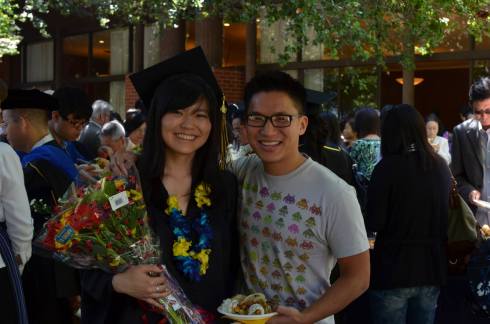For my next guest post, I’m excited to share with you my good friend Jing Xiong’s graduation speech for the Berkeley East Asian Languages and Cultures department, class of 2013. I’ve known Jing since our high school days as co-workers at a local tutoring center, and I’m glad to see her accomplish great things as a fellow Cal Bear.
Jing double majored in Chinese Language and English (literature) at UC Berkeley. She received the departmental citation for East Asian Languages and Cultures, at which graduation she gave this valedictory address. Her honors thesis for the English department is titled, “A Journey to the West: The Influence of the Monkey King on Chinese American Literature,” and traced the presence of the classic Xiyouji in two Chinese American books: American Born Chinese, by Gene Yang, and Tripmaster Monkey, by Maxine Hong Kingston. Jing is an avid tea drinker and took a four-unit course on the history of tea in China and Japan this past semester. She dreams of one day owning a dog. She’s currently relaxing in the 626 and getting ready for a six week adventure in Taiwan, where she’ll study business Chinese and drink a ton of boba milk tea. You can drop her a line (or a job offer) at jingwxiong@gmail.com.
Dear parents, faculty, administrators, and my fellow graduates,
I am honored to speak to you today on such a momentous morning. Today, we gather to celebrate all that we have accomplished throughout these four years, and to honor all of those who have supported us in our studies, intellectually, emotionally, and of course financially.
To be honest though, I never thought I’d major in Chinese. Probably nobody was as surprised as my parents, given the amount of complaining I did when they sent me to Chinese school. But, as I discovered after taking my first Chinese literature class here at Cal, learning Chinese at Berkeley is vastly different from just learning a language. Though we’ve certainly been taught a lot by our language instructors, our education here at the EALC department has enabled us to do more than to simply communicate in a different language—it has also fostered within us a deep sense of appreciation of different cultures, and moreover, has given us the ability to empathize with others, to adopt and adapt to viewpoints that differ from our own. This ability to understand subjectivities apart from our own is a vital one that will aid us in all of our relationships, both personal and professional. In a world of increasingly rapid communication and globalization, our linguistic abilities will be in high demand. But with this globalization comes a sense of alienation, an intense awareness of differences, of the “otherness” of foreign places. In this context, the ability to appreciate and celebrate differences, and to see connections where others might see none, becomes ever more important.
If you asked me in junior high if I would ever take Chinese classes of my own free will, I would have laughed long and hard. But at Cal, I’ve found that my classes in the EALC department have been the ones I’ve looked forward to the most, the ones in which I’ve made the most friends, and the ones whose material lingered in my head long after I’d left the classroom. My study of Chinese has deeply influenced all areas of my life, from my relationship with my parents, to my extracurricular activities, and even to other, seemingly disparate areas of my academic interest. This past year, I worked on an honors thesis for my English major, on the influence of the Ming Dynasty novel Xiyouji, or The Journey to the West, on modern American literature.
Inadvertently, my thesis topic resonates well with why I’m so drawn to East Asian studies. It is because we are in dialogue with people across deep time. When reading Mencius’s rhetoric or the poems of Li Bai, it amazes me that we can still understand these echoes of humanity from someone living in a completely different era. This proves, beyond a doubt, that nobody lives in isolation; we are constantly being influenced and producing influence upon each other.
On the topic of producing influence, I have to say that my experience has been positively shaped by a lot of people. Thank you to the administrators and advisors, especially Jan, who treat us lowly undergraduates with so much kindness and consideration. Thanks to the faculty for their openness, good humor, and their passion for the discipline that inspires us all. Every time I talk to one of them, I’m torn between awe at their sheer intellect and amazement at their down to earth approachability. I’d also like to thank my parents, who have made my education here at UC Berkeley possible. You’ve given me freedom as well as support to pursue my passions. Without you, there is no way I could have come this far. And to my fellow students: I know there are a lot of uncertainties facing us right now, even in the midst of our triumph. But remember that you are armed with the ability to empathize, which is much more important than you think in such a closely joined world as ours. It gives us the ability to be well-adjusted, adaptable, considerate, and genuinely passionate about others. And so, no matter if you’re going to teach English in Japan next year, or applying to law school, or perhaps becoming a full-time job searcher like me, I exhort you all not to worry—be enthusiastic and passionate about what you do, connect with the people around you, and you will do just fine. For now though, it’s time to celebrate our achievements. Congratulations, class of 2013! We made it.
Thanks for sharing your thoughts and for reminding us of the importance of empathy!
—
Journey west at randomtidbitsofthought.wordpress.com.





